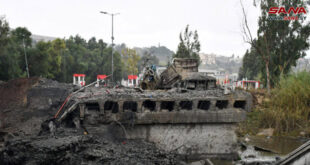Damascus-SANA- Throughout the year 2023, most Syrian governorates witnessed heritage cultural events shedding light on the intangible cultural elements that characterize local communities in an attempt to preserve them.
At the same time, there was an exceptional presence of Syrian cultural elements recorded on the national lists, including “silk cocoons or silk breeding”, “Crafting and playing the Oud”, “Practices and craftsmanship associated with the Damascene rose in Al-Mrah”, “Shadow Theater,” and “Traditional Syrian glassblowing”, which herald the steps of recovery in this field after the war Syria has witnessed which affected its components and cultural elements.
The most notable event was the Inscribing Traditional Syrian glassblowing in 2023 on the List of Intangible Cultural Heritage in Need of Urgent Safeguarding during the eighteenth session of the Intergovernmental Committee for the Safeguarding of the Intangible Cultural Heritage that took place at the Cresta Mowana Resort in Kasane, Republic of Botswana from Tuesday 5 to Friday 8 December 2023.
Traditional glassblowing in Damascus is the artisanal craft of creating glass objects using pieces of waste glass. To create an object, pieces of glass are placed inside a handmade brick oven to melt. The craftsman twists the molten glass around a hollow metal rod. He then blows into the rod to inflate the glass, using metal tongs to mould it into the desired shape, such as a cup, vase, lamp or ornament. Powdered dyes are used to colour the glass while it is still melted or to decorate the objects once they have cooled and hardened. Cultural symbols, such as the hand of Fatima, are often painted or engraved on the glass.
Damascene glassblowing is characterized by the white, blue, green and crimson colours used, as well as the painted gold motifs. In the past, the practice remained within specific families, with the father passing on the secrets of the craft to his children. Today, the related knowledge and skills are passed down informally through hands-on practice and instruction in workshops. A source of livelihood for artisans, Damascene glassblowing contributes to a sense of continuity and belonging. It is also associated with social, spiritual and historical spaces and with the practices that take place therein.
Teams from Culture Ministry and the Syrian Trust for Development, with the participation of craftsmen in traditional glassblowing, worked to monitor inspect this Syrian cultural element, describe the challenges facing it, and document it and prepared the special file that was submitted to UNESCO, which worked to evaluate and approve the national preservation plan for it, which aims to revive the craft and developing it as one of the Syrian creative industries.
 Syrian Arab News Agency S A N A
Syrian Arab News Agency S A N A

